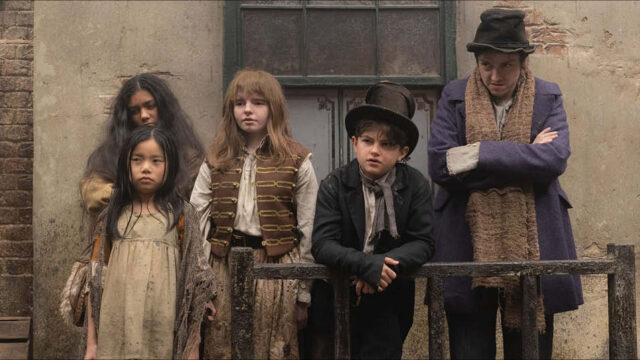TV, film and commercials production have made great strides in sustainability. The challenge now is to get even greener, both on set and on screen. Pippa Considine reports
The TV industry is on track to radically cut emissions on productions. At the same time, there’s now a watchful eye on editorial, keeping narratives real for the audience, helping with sustainable choices.
Major UK and international broadcasters and services have pledged to get to net zero by 2030. Netflix is on track to get there before the end of this year. With physical production making up around half of broadcaster emissions, this means that producers must go green. At COP 26, with the Climate Content Pledge, 12 UK broadcasters and streamers committed to engage and inform audiences on climate change.
The good news is that lockdown saw the carbon footprint of productions in the UK halve, as clocked by the annual report from TV’s environmental support organisation, BAFTA’s albert. In 2020, the average reduction in tons of CO2 emissions per hour of TV produced dropped to 4.4 tonnes, down from 9.2 in 2019. While the number of productions measuring their environmental footprint via albert surged by over 600, to around 2000.
The next steps
As we emerge from the pandemic into a production boom, we need to stick with remote technologies and address power sources and reduce fuel used to get people and kit to and fro. Best case scenario, staying green can save money as well as proving credentials. Although the initial additional workload, alongside health and safety requirements, diversity, wellbeing and so on might seem like another cliff-face, it’s one that has to be scaled.
In carbon reduction speak, it’s not just the Greenhouse Gas Protocol Scopes 1 and 2, but GGP Scope 3 emissions that now need to come down. With Scopes 1 and 2, broadcasters have been focusing on reducing impacts in their own back yard, but Scope 3 means addressing impacts right down the length of the supply chain, putting pressure on productions and their own suppliers to walk the environmental walk.
Measuring impacts is widely acknowledged as the starting point to reducing impacts. Albert’s carbon calculator, originally developed by the BBC and gifted to albert in 2011, has been critical for the TV industry. Next step is for all productions to be albert certified. “We’re there to hold the industry to account on science-based targets,” says Katy Tallon, albert industry sustainability manager, “the certification is a good thing to strive for on the route to net zero.” In 2020, while certified production numbers were up to nearly 500, this was just one quarter of the number of shows using the calculator.

A deeper shade of green
As we head through 2022, the BBC, Sky, Channel 4, Netflix UK and ITV are all mandating albert certification. And the requirements for certification went up a gear in 2021. Before this, the majority of productions were getting three stars; the current, tighter rules have instead seen around 15 per cent.
The list of recent three-star productions shows that it’s possible across genres, with sports coverage, major drama productions, as well as factual shows qualifying.
All albert certified productions must achieve carbon neutral. “We have mandatory requirements at one star to do some quite deep emissions cutting,” says Tallon. To achieve two and three stars, albert is looking for deeper real emission cutting and less pay-as-you-go off-setting, plus demonstrably thought-through editorial approaches.
Green on screen
At production company Picture Zero, the game plan is to bring climate change into the story, both behind the scenes and at the heart of the editorial. It’s So Hot Right Now series of short films for sustainable documentary VOD platform WaterBear, scored three albert stars. Executive producer Steve Smith, who also delivers albert training courses, explains that as well as delivering messages about sustainability, the series came in at 0.18 tons of CO2 emissions. It helped that it was made during lockdown: the production team worked from home and were all on genuine renewable energy tariffs. They used a small studio near to the team in London and LED lighting. Voice recordings from a previous series were recycled. The production paid to offset one ton of CO2 emissions.

While Smith is confident of his company’s sustainable production mindset, he’s clear that the priority for the TV industry is messaging. “The biggest role our industry has to play is telling stories about climate change. There’s no way we’ll get the world to net zero unless we have mass behaviour changing from the public.” In line with the COP26 pledge, it’s all about normalising sustainable behaviour on screen. “The challenge for producers is how do we make sustainable living aspirational,” says Smith. In development at Picture Zero is a big fat green wedding format, which aims to inspire people to lessen the carbon impacts from weddings.
The COP 26 Climate Content Pledge follows a damning report earlier in 2021 from Goldsmith’s University and Smart Energy GB, which assessed that two -thirds of the UK’s most watched shows showed “damaging eco-behaviours.”
In November last year, Sky published research conducted with the Behavioural Insights Team, which showed that eight out of ten viewers support the idea of broadcaster’s ‘nudging green choices through content’. The same report estimated that if just 10% of TV viewers changed their behaviour to prevent food waste, avoid taking lengthy flights, switch to a plant-based diet or use an electric vehicle we could prevent 1.16 bn tonnes of CO2 emissions entering the atmosphere each year.
Makeovers, property and consumer programming provide a good platform for spreading the word. The BBC has RDF West’s Shop Well for the Planet in this space; Channel 4’s Grand Designs, from Fremantle’s Naked has been praised for showing use of recycled materials. Eco-friendly behaviour is increasingly being knitted into popular programming. Even Jeremy Clarkson’s softening views about climate change have been shown during Amazon hit Clarkson’s Farm, from Expectation. As The Handmaid’s Tale screen writer Dorothy Fortenberry has said, “If you’re making a story about anything, in any place, and you don’t have climate change in it, that’s a science-fiction story.”
Sky medical drama Temple, from Hera Pictures, took a pro-active approach to include themes of climate change in Season 2, which launched late last year. “We’ve included a continuous drum beat of sustainability and climate change themes in a really natural and authentic way that adds to the overall narrative and enjoyment of the audience,” says Gabriel Silver, Director of Commissioning for Drama, Sky Studios.
THE B CORP ROAD
B Corp certification measures a company’s whole social and environmental impact. B Corp companies are part of an international network. There’s a yearly fee and status needs to be renewed every three years. So far, B Corps are thin on the ground in the UK TV industry. Vfx outfit Dupe qualified in 2020 and Blue Zoo Productions in 2021. Facility Coffee + TV is also accredited. Achieving B Corp status circles around a 200 entries questionnaire which is revisited until the organisation gets a qualifying score. It can take a while. Coffee + TV ceo and co-founder Derek Moore says, “It’s quite daunting, you have to toughen up and attack it with positivity.” Coffee + TV used a consultant to help them break down the tasks. For a facility, workflow is the nub of the issue when it comes to environmental impact. For Coffee +TV, Moore reckons that computing power and heat accounts for around 80 per cent of emissions. The latest tech is likely to be the greenest tech, but recycling old kit in a green way is vital. Another basic is using a green energy supplier, while ensuring you’re not greenwashed. It’s vital for the whole team to be on board. All staff and freelancers at Coffee + TV must use a renewables energy supplier at home; the company will make up any difference in cost. Amongst other initiatives, staff chipped in on a Slack channel which saw employees uniting over environmental challenges, such as eliminating single use plastic. The result of all the hard work, apart from a head start on mandatory emission reductions, is a happier staff. And Moore believes that it’s grown his bottom line. “You win more from clients who care and we’ve had interesting industry exposure.”
Dramatic reductions
Drama production has some of the biggest physical production challenges around emissions. At Carnival Films, head of production Charlotte Ashby has been a leading force behind the development of a Green is Universal production toolkit, which is used across the Universal International Studios group. The toolkit, which includes guidelines, start-up slides and templates, is aligned with albert and shared with the industry through Creative England. The approach helped the team to achieve albert certification for both season 5 of The Last Kingdom and new BBC drama Dodger.

Finding someone to own responsibility for sustainable production values is central to lessening impacts. Ashby says that there’s an industry move to create sustainability supervisors, very much like Covid supervisors, “not a very junior member of the team, but someone who can have a conversation with people at a head of department level.” She muses over whether resources that have been used for Covid management, might now be re-routed.
On lower budget productions, this raises issues for staffing. At Picture Zero, Smith notes that production managers already have a lot on their plate. “We need to recognise that we’re adding a huge workload…..There may well be an opportunity for a production company to get a green runner, or sustainability steward.”
To make appreciable inroads there is a raft of changes needed, both big and small. “The biggest challenges are undoubtedly fossil fuels used, for travel and power generation, and within our supply chain these are very difficult nuts to crack,” says Ashby. “Film and drama is a mobile circus that travels around and energy efficiency has not been a priority”. Wherever possible, productions can use local crew, or encourage cast and crew to minimise journeys, travel by rail, stay over rather than commuting. For location filming, switching generator fuel from diesel to alternative fuel can reduce emissions.
Netflix smash hit Bridgerton managed to significantly reduce emissions on its UK shoot for Season 2 in part by piloting a GeoPura emission-free, green hydrogen power unit in place of multiple diesel generators. Power from the unit was enough to stand in for several diesel generators, while by products included clean drinking water and silence.

A sporting chance
At Sky Sports, all UK and Irish OB generators are now run from biofuels. Since January of 2021 all Sky Sports UK productions have been carbon neutral and opportunities have been taken to use events to spread useful messaging towards climate change awareness. One area that can reduce impacts is by using remote working. In sport, remote production has really proved a way forward, led by its football coverage with OB expert NEP and sister infrastructure company NEP Connect.
Some remote workflows are more green than others. Blackbird Video and environmental management consultancy Green Element recently compared different remote operations at sporting events, looking at cloud based, on premises and cloud native. On premises scores lowest, dragged down by travel impacts and the installation of on-site production rigs; cloud-based uses more energy to move material into and out of the cloud; while cloud native appears the greenest option, being eleven times as efficient as on-prem.
Industry body the Digital Production Partnership has its own Committed to Sustainability mark. Since its launch in 2019, 40 companies, including BT, Clear Cut Group, Dolby and Shoot Blue have taken part in the scheme, which is based on achieving scores across four core areas.
Abdul Hakim, DPP Business Development Manager explains how the Committed to Sustainability mark is based on a self-assessment questionnaire, submitted with supporting evidence. There is a score out of five and companies are encouraged to publish and to resubmit and improve their score. “The industry average is currently at three and we want to increase this quite rapidly,” says Hakim.
Hakim suggests that first steps for companies might be broader, organisational targets, including training and organising management structure, but then moving to science-based emission reduction targets. The DPP works with albert, referencing their tools and recommendations, such as albert’s Creative Energy Supplier. “They’ve done a lot of groundwork,” says Hakim. “There’s no point in reinventing the wheel.”
Jon Creamer
Share this story



















